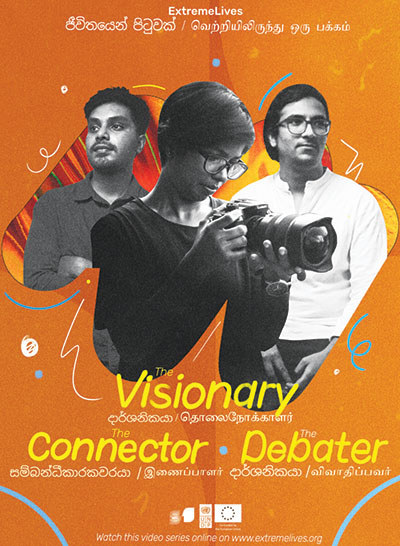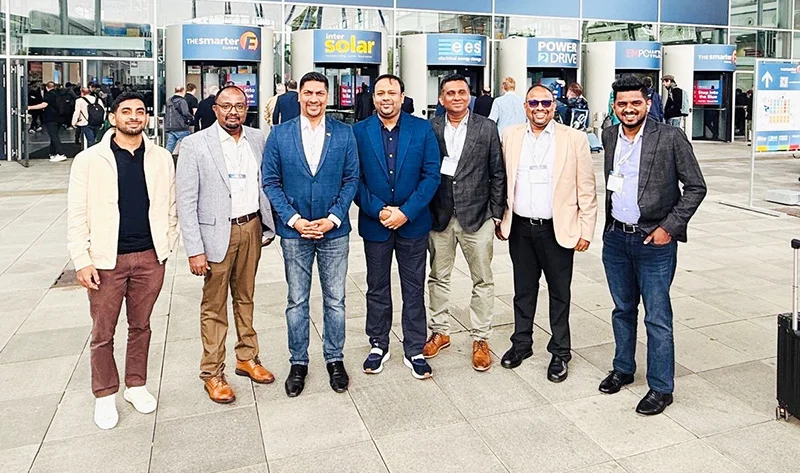Business
ExtremeLives is back with transformative stories of youth from South Asia

On 20 January 2022, UNDP and the European Union launched the 4th season of the much anticipated ExtremeLives video series. This season showcases stories of individuals from Maldives and Sri Lanka, who, against all odds, have transformed their lives to overcome some of the most pressing personal challenges in their communities. Issues of drug abuse, hate and inequalities are amongst the topics that are explored through first-person storytelling in local languages.
“Over the last few years, multiple shocks have shaken the world, making people more apprehensive about their future, their welfare, their values.” highlights the Head of Delegation of the European Union to Sri Lanka, Ambassador Denis Chaibi. “In this context, we are all at risk of losing our humanity and critical judgement. This is why the EU funded UNDP programme is showing how vulnerable people managed to get through difficult times. We hope that these lives will inspire many people who find a safe path through peaceful social inclusion.”
The videos are developed to invoke viewers’ empathy with the characters, inspire youth from South Asia to explore solutions to their own challenges, needs and aspirations to make positive changes in their lives and communities. To increase the resilience of its viewers, the videos subsequently offer digital resources, including tips on well-being and mental health and links to volunteering, interests and job opportunities.
“UNDP is proud of its partnership with the EU on the launch of another Season of ExtremeLives. Together we have designed and produced the new season of the ExtremeLives focusing on stories of people in Maldives and Sri Lanka using the people-centred approaches of behavioural science to address root causes of radicalization in South Asia,” said Robert Juhkam, Resident Representative, UNDP in Sri Lanka. “We hope that this series will serve as an inspiration for youth in Sri Lanka and become an important driver of positive changes in the communities across the region.”
This season has been designed and produced differently from other ExtremeLives videos. Through investment in behaviour analysis and measurement activities, UNDP aimed for the videos to target young people vulnerable to violent extremist narratives. Key messages on positive behaviours were promoted with the objective to encourage and contribute to the resilience of communities to violent extremism in South Asia. As part of its M&E strategy, UNDP has developed a survey adopting an innovative method of gamification. The format of the video game is interactive and engaging for the target audience, allowing UNDP to collect important behaviour insights from viewers in the region.
Business
World Bank may convert infrastructure loans into tradable assets

A game-changer for Sri Lanka’s capital market
As the global community convened for the World Bank Group’s 2025 Spring Meetings under the timely theme “Jobs: The Path to Prosperity,” one message stood out: prosperity in the developing world depends not only on physical infrastructure but also on strong financial systems.
Among the influential voices at this year’s gathering was Douglas L. Peterson, Special Advisor to S&P Global and a longstanding advocate of resilient market economies.
Drawing from a decade-long tenure as CEO of S&P Global, Peterson delivered key insights that resonate deeply with the challenges and opportunities facing emerging economies such as Sri Lanka.
Peterson stressed that while global capital is abundant, it doesn’t move indiscriminately. “It follows signals, namely, data, transparency, regulatory certainty, labour and market stability.”
“When investors look to deploy capital in developing markets, they’re seeking a solid financial infrastructure,” Peterson said. “That includes reliable data, transparent pricing mechanisms, independent credit rating agencies, and clearly defined bankruptcy laws.”
These factors may not make headlines, but Peterson underscored their essential role.
“Financial infrastructure enables confidence, and confidence attracts investment,” he said.
A key initiative Peterson is championing in collaboration with the World Bank is titled ‘Originate to Distribute’, a structured finance approach where loans are created by institutions like the World Bank but sold to private investors.
Traditionally, loans from development banks remain on their balance sheets for decades. This initiative proposes standardising and structuring such loans so that private investors can purchase, pool, and trade them – essentially converting infrastructure loans into a new, tradable asset class.
“This is about creating velocity and scale,” Peterson said. “If the World Bank can originate loans and distribute them to the private sector, every dollar stretches further. It helps close the multi-trillion-dollar infrastructure investment gap.”
For countries like Sri Lanka, where public finances are under pressure, such a model could unlock significant private capital provided the regulatory environment and financial infrastructure are prepared to support it.
In alignment with the World Bank’s focus on job creation, Peterson prioritised five sectors he believes are pivotal for employment growth in developing nations: infrastructure (both physical and digital), agri-business, healthcare, tourism, and manufacturing. The common thread across all these sectors, he asserted, is infrastructure.
“Build an airport and you get hotels, transport services and even carbon savings,” Peterson said. “A bridge not only connects communities but also cuts costs, travel time, and emissions.”
According to Peterson, infrastructure investment yields a multiplier effect, often generating an additional $1.40 to $1.60 for every dollar spent. It also catalyses other industries. Manufacturing depends on roads and ports; tourism needs transport and energy; agriculture requires logistics and storage; and healthcare relies on reliable access and communication systems.
Peterson’s reflections also touched on a more structural issue that Sri Lanka is currently facing; the need to develop robust domestic capital markets. He emphasised moving beyond a banking-dominated financial system toward one that includes institutional investors like insurance companies and pension funds.
“These institutions become long-term investors,” he noted. “They form the foundation for sustainable infrastructure investment. Homegrown capital reduces reliance on external debt and increases financial resilience.”
Peterson’s remarks serve as a timely reminder as job creation and long-term prosperity in Sri Lanka will not come through piecemeal efforts. Instead, they require coordinated investments in both physical and financial infrastructure, from better roads and ports to regulatory frameworks that inspire investor confidence.
Unlocking private capital through trust, transparency, and smart financial engineering is the way forward. And as leaders like Peterson have shown, the tools and models already exist. It is now up to policymakers and financial leaders in Sri Lanka to ensure Sri Lanka is ready to embrace them.
Douglas L. Peterson currently serves on the board of the UN Global Compact and was formerly CEO of S&P Global, where he expanded the company’s market capitalisation from $16 billion to over $150 billion. He also led the G7 task force on sustainable finance in 2021.
By Sanath Nanayakkare
Business
AHK Sri Lanka facilitates business delegation to Intersolar Europe 2025

The Delegation of German Industry and Commerce in Sri Lanka (AHK Sri Lanka) successfully organized a visitor delegation to Intersolar Europe 2025, held from 7 – 9 May in Munich, Germany. Recognized globally as one of the most significant and comprehensive trade fairs dedicated to the solar industry, Intersolar serves as a premier platform for showcasing the latest innovations in renewable energy and sustainable technologies.
The Sri Lankan delegation comprised senior representatives from prominent companies in the sector, including Mega Solar, Micro PC Systems, Eco Solar Rays, and Puwakaramba Building Solutions, reflecting the country’s growing commitment to advancing renewable energy solutions.
The primary objective of this visit was to provide Sri Lankan companies direct access to the latest developments in solar technology, including sustainable energy solutions, energy storage systems, e-mobility, floating solar applications, agrivoltaics and recycling solutions. By connecting local enterprises with cutting-edge technologies and global industry leaders, AHK Sri Lanka aims to facilitate the adoption of modern energy solutions in Sri Lanka and support the nation’s broader transition to a more sustainable and energy-secure future.
A key highlight of the delegation’s agenda was a strategic meeting with the organizers of Intersolar Europe. This engagement provided valuable insights into the exhibition’s future vision and fostered discussions on potential collaboration opportunities between German and Sri Lankan stakeholders in the renewable energy sector.
Further amplifying the value of the delegation, AHK Sri Lanka coordinated over 25 tailored B2B meetings between Sri Lankan companies and German/European industry counterparts. These curated matchmaking sessions enabled participants to explore commercial opportunities, initiate technical partnerships, and lay the groundwork for future investments and joint ventures.
Business
Prime Group appoints Umaria Sinhawansa as Global Brand Ambassador

Prime Group, Sri Lanka’s leading real estate brand with a 30-year legacy and international branches in Australia and Dubai, has named celebrated Sri Lankan music icon Umaria Sinhawansa as its Global Brand Ambassador. This partnership unites two Sri Lankan powerhouses to showcase local talent and excellence worldwide.
The collaboration aims to strengthen Prime Group’s global expansion while promoting Sri Lankan culture. Umaria, who bought her first property from Prime Group a decade ago, expressed pride in representing the brand. Prime Group’s Co-Chairperson, Sandamini Perera, highlighted Umaria’s embodiment of Sri Lankan heritage and global appeal, aligning with their mission to elevate the country’s real estate innovation.
Together, they aim to inspire trust, connect with international markets, and celebrate Sri Lanka’s cultural richness on a global scale.
-

 Features5 days ago
Features5 days agoSAITM Graduates Overcome Adversity, Excel Despite Challenges
-

 News5 days ago
News5 days agoDestined to be pope:Brother says Leo XIV always wanted to be a priest
-

 Opinion5 days ago
Opinion5 days agoDrs. Navaratnam’s consultation fee three rupees NOT Rs. 300
-

 Sports5 days ago
Sports5 days agoASBC Asian U22 and Youth Boxing Championships from Monday
-

 Foreign News6 days ago
Foreign News6 days agoMexico sues Google over ‘Gulf of America’ name change
-

 Features4 days ago
Features4 days agoChampioning Geckos, Conservation, and Cross-Disciplinary Research in Sri Lanka
-

 Business5 days ago
Business5 days agoDilmah – HSBC future writers festival attracts 150+ entries
-

 Business5 days ago
Business5 days agoBloom Hills Holdings wins Gold for Edexcel and Cambridge Education












